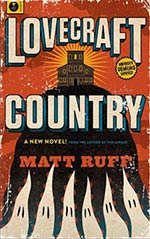
![]() verkisto
verkisto
7/26/2016
![]()
It's a new Matt Ruff novel! This is a bit of an event for me. They tend to come out about once every 5-7 years, but they're always interesting and thoughtful. I'm less concerned about an author's frequency of writing as much as I am the quality of it, and when someone like Ruff has proved himself as a quality writer, I'm all about reading his next book.
I didn't do much research into Lovecraft Country before I read it (Ruff is one of those "Read it immediately, no questions asked" authors for me, in case you hadn't figured that out), so I was surprised to find that it was more a collected series of short stories and novellas than it was a strict novel. It's fine, but I was looking forward to a full novel.
On the bright side, Ruff is a gifted, talented author, and the individual stories in Lovecraft Country come together to form a larger story, one of a family in the 1950s Jim Crow-era United States fighting against a wizard who wants to use their family to help him achieve his own goals. In Ruff's novel, "wizard" means someone who has mastered the use of magic, but it's also a sign of how clever he is with the story, since that's also the title of the leader of the KKK.
Ruff balances the stories between the vast, unnameable horrors that Lovecraft created, and the terrible, prejudiced horrors that Blacks endured during the Jim Crow era. Even when the stories are primarily about the Lovecraftian horrors, Ruff makes them about the racism, and it's a perfect blend of story and meaning. I mean, check out the cover -- those white figures at the bottom could be taken as ghosts, but in reality, they're actual people wearing sheets. Ruff takes that dichotomy and applies it toward his stories, as well, most notably near the end of the book when one character warns the rest that they will have to be on a constant lookout for danger for the rest of their lives, which causes the other characters to laugh, saying, essentially "That's no different than every other day of our lives."
It's also interesting to note that Ruff sets this novel of racism against the backdrop of a mythology created by someone who was, himself, pretty racist. He doesn't offer any apologies, directly or indirectly, but there's an obvious, ironic tip of his hat to Lovecraft in his story.
The story works very well, as fiction as well as thinkpiece, which is normal for Ruff. I'd recommend this to anyone who likes supernatural or historical fiction, though it's probably geared more to the former group than the latter. Still, anyone interested in a story told from the perspective of a black family in Jim Crow-era United States would find a lot to like here.